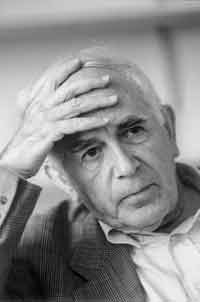
Tugendhat and Tugendhat celebrates 80 years
 |
Ernst Tugendhat was born in Brno, not in the villa but in a clinic, and the first apartment he lived in was an apartment on Drobného Street, where his parents lived at the time. The family was steeped in German culture, and German was essentially the only language spoken there. After Hitler came to power a few years later, young Ernst was sent to a Czech kindergarten, later to a Czech boys' school that has since been bombed, located right next to the Esplanade café. As he later confided to me, he struggled with Czech and it was said to be noticeable in the behavior of the teachers. However, his school results do not indicate anything of the sort. Unfortunately, he no longer commands the Czech language.
Although he spent a large part of his childhood in the famous villa, I would caution against speculations about how this exceptional architecture shaped the character of his philosophy.
Even as a child, he experienced what it was like to be a refugee. His parents escaped from Nazism in time, having thoroughly planned their journey through several countries in advance based on excellent information. This real display of activity against the horrific danger is in itself an exciting reality. Although the Tugendhats lost most of their possessions, they saved their lives and, thus, the family as a whole. The theme of refugees later became close to Ernst Tugendhat, and he addressed it theoretically in several works. After fleeing Czechoslovakia, he attended cantonal schools in St. Gallen for a while, and later, when they safely sought refuge in Venezuela, he graduated from the excellent Collegio Americano in Caracas, operated at a high level by the Presbyterian Church and which has played a significant role in the formation of the Venezuelan elite. By then, he had developed a concrete interest in philosophy, having been inspired by reading a book by Heidegger that his mother inadvertently lent him at the age of fourteen. He was excellently prepared for American universities from Collegio Americano and soon after the war, he began his primary university studies at Stanford University. He then moved to Europe, where he also became a student of Heidegger at the University of Freiburg, graduated, and later obtained a doctorate with a thesis on an Aristotelian topic titled Ti kata tinos. Since 1980, he was a full professor at the Freie Universität Berlin, where his public activity developed the most. Tugendhat was, in essence, in line with the family tradition very close to the distinct left and was also involved in the peace movement. His participation in marches against American missiles is well known. Nevertheless, he did not hesitate to visit Prague, along with his older colleague Jürgen Habermas, during difficult times, where at the beginning of March 1982 he gave lectures in the apartments (at the underground university supported by the Jan Hus Foundation) of Ludvík Hejdánek and Petr Rezek. Upon entering Rezek's apartment, two uniformed members of the VB stood outside, but they allowed the philosopher inside and let the seminar proceed without interruption. Tugendhat was a visiting professor at several other universities, including Oxford and prestigious universities in South America. After the revolution, he briefly lectured in Prague as well. Unfortunately, after his appointment as an honorary citizen, I was unable to arrange his engagement at Masaryk University, despite my extensive efforts and advocacy on all sides. At that time, I had the opportunity to have extensive conversations with him while walking in Brno, which confirmed his distance from architecture and almost no interest in the problems that architecture faces. For architecture, perhaps only one of his statements is significant: when continually asked about the entry into the UNESCO list, he noted that the value of the work itself (the Tugendhat villa) is important, not the formality of any entry. I would like to remind you that the villa was globally significant from the very beginning, and it was evident to his family and others as early as the 1930s. It was a subtle reminder to focus attention on the essence of things and not on unimportant formalities.
There may be indirect connections between architecture and philosophy. Theoretical thinking is certainly more than desirable for the architect's strategic reasoning, just as some philosophers, especially those dealing with ethics, sometimes understand the topics of architecture as a starting point for their generalizations. However, a direct connection can sometimes be deceptive, as evidenced by rather hasty speculations about how the space and milieu of the villa shaped the thinking of the future philosopher. Great caution is also warranted when concluding that the philosophy and theoretical writings of Romano Guardini directly shaped the specific expressions of Ludwig Mies van der Rohe.
Ernst Tugendhat is the author of several influential works, some of which have also been published in Czech, the first of which was thanks to Petr Rezek - Ernst Tugendhat: Logicko-sémantická propedeutika. Prague: Rezek 1997.
We wish him health and further enthusiasm on this honorable life anniversary.
Ad Mea Veesrim Šana.
Jan Sapák
The English translation is powered by AI tool. Switch to Czech to view the original text source.
0 comments
add comment









